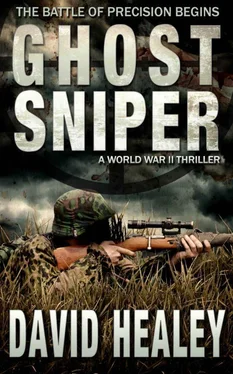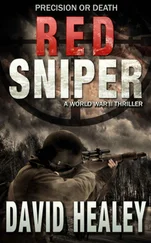“Get out,” Von Stenger said.
The men were unshaven, battle-hardened veterans and they might have argued, considering that his rank insignia was hidden beneath his camouflage smock, but they took one look at the scoped rifle, the Knight’s Cross at Von Stenger’s throat and the cold blue eyes, then cleared out.
“Ich habe über der sniper,” he overheard one of the men say out in the hallway. “ Dieser Mann ist ein kaltblütiger Killer.” That man is a cold-blooded killer. “ Ich mag es nicht sniper. Das Gespenst.”
He looked around the room, which now felt very empty. Wulf was dead and the boy was either captured or dead. He did not mind being alone; in fact, he preferred his own company.
The enlisted men had lit a fire in the old fireplace. Von Stenger took off his boots and his camouflage smock, then put them by the fire to dry. His belly rumbled. Even Das Gespenst got hungry. He wished he could order up room service. He smiled to himself. Room service. Wouldn’t that be something! That might be the perfect war, he thought, if one could hunt the enemy by day and then return to one’s hotel to a good meal.
Well, perhaps he could do something about that. He went out into the hallway in his stockings and found a fresh-faced orderly who was properly intimidated by the sight of a Wehrmacht captain, and sent him down to the kitchen with orders to bring him a plate of food.
There was an air of excitement throughout the old chateau. Like Von Stenger, many of the men here were resting for the night before getting back into action at daybreak. Though battle weary, no one showed any indications of being defeated. While the Allies had landed in force—Americans, Canadians, Scottish and English—the Germans had far from lost the fight. Reinforcements were pouring in, including SS units and Panzer divisions, all under the command of General Rommel. The Allied air superiority combined with the sheer numbers of enemy troops might push the Germans out of Normandy, but they would make them pay for every acre between the hedgerows.
The Allies were learning what war meant—it was the kind of war some of these German troops had been fighting for years. They were professional soldiers who were good at killing, Von Stenger included. No one bore any particular grudge against these invaders—it wasn’t as if they were fighting the hated Red Army—but they were simply the enemy.
The crowd at the chateau included a few women, most of them tearful. These were French women who had cast their lot with the occupiers—out of love or the advantages that having a German lover brought. Now that the Germans might be leaving, they were fearful. There would be repercussions—shaved heads, drumming out of town—that consorting with the enemy would bring. Frantically, they were either looking for their men who were now dead or somewhere in the field. Some of the unluckiest ones now had bastard babies fathered by German soldiers.
Everywhere, Von Stenger heard stories being traded about exploits that had taken place earlier that day. He lit a cigarette and lounged in the hallway and listened.
“You should see how the Tiger tanks make short work of the Sherman tanks being used by the Americans and Tommies,” one soldier said. “One shot and that is it for them. Kaboom!”
Another soldier was talking about the battle at Bienville, a village on the road to Carentan. Von Stenger was well aware that Carentan was one of the larger towns on Normandy’s Cotentin Peninsula and the Allies were eager to capture it, but first they had to collect the little towns that dotted the road like beads on a string. Bienville was one such place and there had been a hot skirmish fought there that day.
“We were the last ones out,” the soldier said. He had a bloody bandage wrapped around his upper arm. “We found ourselves trapped in the church and so we planned to make a last stand there. We would have been captured or killed, I suppose, but the priest showed us a tunnel that led out into the marshes. He said there had been enough bloodshed for one day. We had to leave our wounded behind. The Americans are holding Bienville now, but we are taking it back in the morning.”
The orderly reappeared with a plate of food. The plate was piled high with steak, potatoes and red cabbage. There was a tall mug of black coffee. Von Stenger was impressed. It was more than he could eat. He had the orderly bring it to his room. If this had been a hotel, Von Stenger would have given him a tip. But one did not tip soldiers. Instead, he gave him half a bar of chocolate. The orderly was still young enough that his face lit up at the sight of the candy. “Thank you, Herr Hauptmann!”
Von Stenger pulled a chair and a small table close to the fire and had just sat down when the orderly returned.
“Herr Hauptmann, there is someone downstairs to see you.”
“Who?”
“A woman.” The young orderly blushed a bit. “She asked for you by name.”
Von Stenger was puzzled as well as curious. He was certain that he did not know a single woman in France, so who could it be? “Well, bring her up.”
He took out his Walther P38, set it on the table beside the plate, and put a newspaper on top of it. The orderly appeared in the doorway, followed by a French woman Von Stenger did not recognize. He guessed that she was in her early twenties, and she was good looking rather than pretty. She wore trousers, which was in itself unusual, and an unflattering sweater the color of old dead leaves; her hair was pulled back in a business-like bun and she wasn’t wearing any makeup. The dark eyes that glanced at him were wary and sly, like those of a fox. This was no simple local girl. One of the maquis , he thought. French Resistance. He stood out of politeness as she entered, but as he did so he kept one hand on the table beside the newspaper.
“Hello mademoiselle,” he said in French, bowing politely but keeping his eyes on her. “I do not believe we have met. To what do I owe the pleasure?”
The young woman hesitated, and her hand drifted to the small of her back, just where she would keep a knife or pistol. His hand edged closer to the hidden Walther. Then the woman dropped her hand.
“You are Von Stenger? I have information for you.”
“In that case, you are just in time for supper.” He told the orderly to drag an empty chair up to the table. He would have done it himself but he did not want to turn his back on this woman. “Please, have a seat.”
“Really, I must—”
“Join me,” he said. “I insist. I hope you have not come to tell me that we have a bastard child together, like these poor wretches in the hall. What will you French do to them once we have gone?”
“Once you have gone?”
“Mademoiselle, the Allies have landed thousands of troops and scores of tanks. They control the skies. It is a foregone conclusion that we cannot hold Normandy. The numbers are not in our favor. But we shall make them pay dearly for it. Please, join me.”
The woman sat, and the orderly was back in a minute with an empty plate for her, as well as a knife and fork. She stared, somewhat wide-eyed, at the steak and potatoes. The French had to make do with less wholesome fare, while the best food went to the occupiers.
“That smells delicious,” she said, and slowly, as if against her better judgment, she reached for her knife and fork.
“The spoils of war,” he said. Von Stenger considered a moment, and then asked the orderly to bring him the bottle of Bordeaux that he had been keeping in his rucksack, wrapped carefully in a rag. “I have been saving this for a special occasion. I have the feeling that tonight may be my last opportunity to enjoy it.”
“Why do you say that?”
Читать дальше












